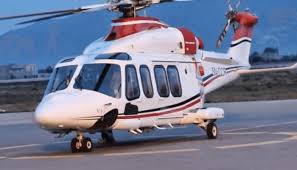The Nigerian Airspace Management Agency (NAMA) has issued a serious warning to oil and gas companies operating in the country, accusing them of failing to comply with the mandatory $300 helicopter landing levy. The agency said it will take enforcement actions, including denying flight clearances and possibly shutting down non-compliant facilities, if the companies continue to ignore its directive.
In a public notice released on Tuesday, June 24, NAMA said it has been engaging the oil and gas sector on the issue since 2022. It noted that the agency, in collaboration with its consultant, Naebi Dynamic Concepts Limited, has made several efforts to ensure compliance with the Nigerian Airspace Management Agency Act of 2022, which mandates payment for air navigation services.
NAMA said helicopter landings at oil fields, terminals, platforms, rigs, Floating Production Storage and Offloading (FPSO) units, helipads, airstrips, and aerodromes fall under its air traffic control responsibilities and are subject to the levies. The agency stated that several written communications have been sent to affected companies, but response and compliance have remained poor.
According to the agency, some individuals within the sector have been working against the enforcement of the law, encouraging oil companies to ignore regulatory directives. NAMA, however, did not disclose the names of these companies or individuals involved.
“Since 2022, the Nigerian Airspace Management Agency, in partnership with Naebi Dynamic Concepts Limited, has consistently issued multiple written communications to engage oil and gas operators on the statutory provisions of the NAMA Act. Regrettably, these proactive efforts have not yielded the desired compliance,” the agency said.
NAMA defended the levy by stating that similar charges exist in other countries under the International Civil Aviation Organisation (ICAO), and that Nigeria must not fall behind in global aviation standards. It explained that the $300 helicopter landing charge is critical to maintaining, upgrading, and acquiring air navigation infrastructure in the country’s airspace.
“These levies are essential to sustaining the maintenance, upgrading, and acquisition of modern air navigation infrastructure, especially with the rise in drone operations, helicopter activities, and fixed-wing aircraft in Nigeria,” it said.
The agency further emphasised that under Sections 8 and 9 of the NAMA Act, only NAMA is legally allowed to manage and provide air navigation services across Nigerian airspace. It warned that failure to comply will lead to serious consequences, including the denial or withholding of flight clearances for helicopter operations.
“In more serious cases involving unauthorised helipads or platforms operating without NAMA clearance, the agency will seek ministerial approval to shut down or relocate such facilities in line with Section 8(3) of the Act,” the notice stated.
NAMA has now given a seven-day ultimatum for all affected oil firms to submit their payment plans to Naebi Dynamic Concepts Ltd. The agency said failure to comply will lead to enforcement measures beginning with the denial of flight approvals to oil installations.
“This action is undertaken not merely to enforce regulatory compliance, but to safeguard national security, enhance aviation safety, promote operational sustainability, and ensure the continued efficiency of Nigeria’s aviation ecosystem,” the agency said.
The helicopter landing levy has been a contentious issue in the aviation and oil sectors. Introduced in 2024, the $300 per landing fee sparked complaints from helicopter operators, who claimed the levy was introduced without consultation and was arbitrary. Following pressure from stakeholders, the implementation was briefly suspended.
However, a memo dated May 15, 2025, directed Naebi Dynamic Concepts to resume collection, as NAMA maintained that the charges were necessary to offset high operating costs and improve service delivery at remote locations, including offshore oil platforms and helipads.
Industry experts have raised concerns that this latest enforcement notice could disrupt oil production. If helicopter operators are denied clearance, oil workers may face difficulties in accessing offshore fields, potentially affecting Nigeria’s crude output.
NAMA insists the levy is not just a revenue tool but a safety and regulatory measure to ensure Nigeria keeps pace with global aviation practices. It called on oil firms to comply within the deadline to avoid disruptions and reputational damage.
